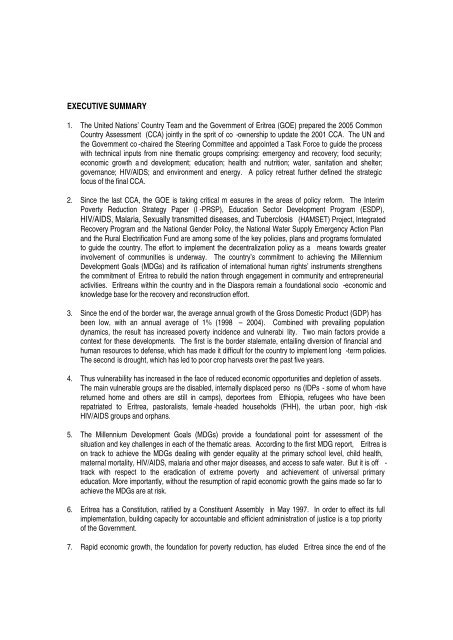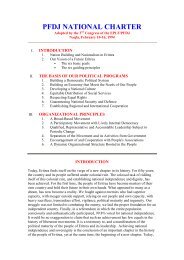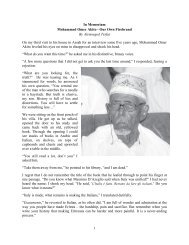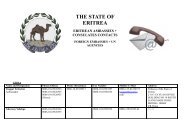Common Country Assessment (CCA) - ECSS | Eritrean Center for ...
Common Country Assessment (CCA) - ECSS | Eritrean Center for ...
Common Country Assessment (CCA) - ECSS | Eritrean Center for ...
You also want an ePaper? Increase the reach of your titles
YUMPU automatically turns print PDFs into web optimized ePapers that Google loves.
EXECUTIVE SUMMARY<br />
1. The United Nations’ <strong>Country</strong> Team and the Government of Eritrea (GOE) prepared the 2005 <strong>Common</strong><br />
<strong>Country</strong> <strong>Assessment</strong> (<strong>CCA</strong>) jointly in the sprit of co -ownership to update the 2001 <strong>CCA</strong>. The UN and<br />
the Government co -chaired the Steering Committee and appointed a Task Force to guide the process<br />
with technical inputs from nine thematic groups comprising: emergency and recovery; food security;<br />
economic growth a nd development; education; health and nutrition; water, sanitation and shelter;<br />
governance; HIV/AIDS; and environment and energy. A policy retreat further defined the strategic<br />
focus of the final <strong>CCA</strong>.<br />
2. Since the last <strong>CCA</strong>, the GOE is taking critical m easures in the areas of policy re<strong>for</strong>m. The Interim<br />
Poverty Reduction Strategy Paper (I -PRSP), Education Sector Development Program (ESDP),<br />
HIV/AIDS, Malaria, Sexually transmitted diseases, and Tuberclosis (HAMSET) Project, Integrated<br />
Recovery Program and the National Gender Policy, the National Water Supply Emergency Action Plan<br />
and the Rural Electrification Fund are among some of the key policies, plans and programs <strong>for</strong>mulated<br />
to guide the country. The ef<strong>for</strong>t to implement the decentralization policy as a means towards greater<br />
involvement of communities is underway. The country’s commitment to achieving the Millennium<br />
Development Goals (MDGs) and its ratification of international human rights’ instruments strengthens<br />
the commitment of Eritrea to rebuild the nation through engagement in community and entrepreneurial<br />
activities. <strong>Eritrean</strong>s within the country and in the Diaspora remain a foundational socio -economic and<br />
knowledge base <strong>for</strong> the recovery and reconstruction ef<strong>for</strong>t.<br />
3. Since the end of the border war, the average annual growth of the Gross Domestic Product (GDP) has<br />
been low, with an annual average of 1% (1998 – 2004). Combined with prevailing population<br />
dynamics, the result has increased poverty incidence and vulnerabi lity. Two main factors provide a<br />
context <strong>for</strong> these developments. The first is the border stalemate, entailing diversion of financial and<br />
human resources to defense, which has made it difficult <strong>for</strong> the country to implement long -term policies.<br />
The second is drought, which has led to poor crop harvests over the past five years.<br />
4. Thus vulnerability has increased in the face of reduced economic opportunities and depletion of assets.<br />
The main vulnerable groups are the disabled, internally displaced perso ns (IDPs - some of whom have<br />
returned home and others are still in camps), deportees from Ethiopia, refugees who have been<br />
repatriated to Eritrea, pastoralists, female -headed households (FHH), the urban poor, high -risk<br />
HIV/AIDS groups and orphans.<br />
5. The Millennium Development Goals (MDGs) provide a foundational point <strong>for</strong> assessment of the<br />
situation and key challenges in each of the thematic areas. According to the first MDG report, Eritrea is<br />
on track to achieve the MDGs dealing with gender equality at the primary school level, child health,<br />
maternal mortality, HIV/AIDS, malaria and other major diseases, and access to safe water. But it is off -<br />
track with respect to the eradication of extreme poverty and achievement of universal primary<br />
education. More importantly, without the resumption of rapid economic growth the gains made so far to<br />
achieve the MDGs are at risk.<br />
6. Eritrea has a Constitution, ratified by a Constituent Assembly in May 1997. In order to effect its full<br />
implementation, building capacity <strong>for</strong> accountable and efficient administration of justice is a top priority<br />
of the Government.<br />
7. Rapid economic growth, the foundation <strong>for</strong> poverty reduction, has eluded Eritrea since the end of the





